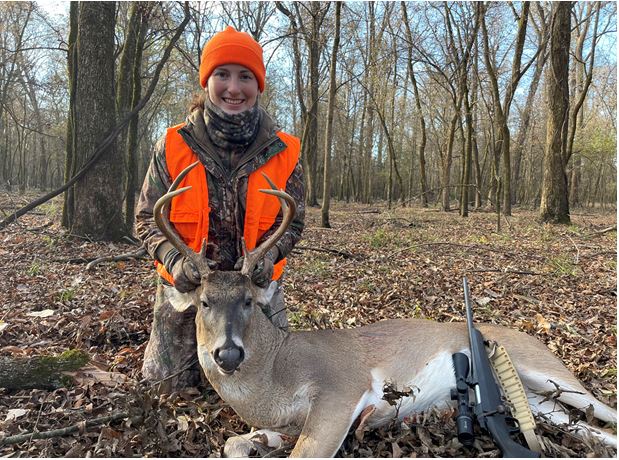
SCIF-Sables is proud to announce Jessica Engstrom from West Virginia University as one of the recipients of SCIF-Sables’ Endowed CJ McElroy Hunting Heritage Scholarship. Jessica is a junior in the Wildlife and Fisheries Resources program. She is receiving a scholarship for the 2023/24 academic year, as well as her senior year. Jessica had this to say about her passion for hunting, who influenced her, and how hunting plays a crucial role in wildlife conservation.
“I grew up in multiple suburbs of Chicago, where I attended Bolingbrook High School, an Illinois school with over 5000 students. Unfortunately, my high school did not promote hunting or conservation, but my family did. From a young age, my home life taught me how to hunt and how to conserve our resources as a society. My love for conservation began when I was catching turtles in Indiana for fun, and this passion grew over the years leading me to take up this major in Wildlife and Fisheries Resources. Upon graduating, I hope to expand my knowledge by working with the USDA APHIS community studying zoonotic disease spread and management. I also want to run an outdoor education program to inform the public about the importance of our wildlife and different management techniques.
Before I ever started going to grade school, my father and grandfather would take me on their hunting trips. Unfortunately, due to my parent’s divorce, my dad was unable to hunt for many years, but we still practiced shooting in the backyard and prepping for the next season. Every year after, we would hunt public lands, most of them being well over an hour’s drive away from home. This made me appreciate hunting more than ever, because on public land in Illinois, there are very few opportunities to hunt, let alone take an animal. Now that I am in college and have met new people, I have had many more opportunities to hunt a variety of species in multiple different states, mostly on private lands. Every hunting experience is better than the last, with life-long memories built with amazing people. I was always taught that hunting was not only about the kill of the animal, but about the good you do by taking the animal from an overpopulated area. Hunting plays a crucial role in wildlife conservation. The definition of wildlife conservation is to protect wild species and their habitats to maintain healthy wildlife species or populations. With this, the species that have more individuals on the landscape than the natural carrying capacity allows for need to be reduced. There are multiple factors that go into what the carrying capacity is for a population. One of these factors is deemed the limiting factor, this is because it only provides a certain availability to wildlife, and because of this, the population is limited in growth. When the limiting factors are high, the population does not reach a maximum number of individuals until there are already too many on the landscape. For example, a factor that influences white-tailed deer population growth is the abundance of predators. Unfortunately, in many states, there is a lack of white-tailed deer predators, this leads to an increase of deer, which eventually leads to more human-wildlife interactions. Many of these interactions are negative, such as a car accident which often leads to the death of the deer. On the bright side many of the deer killed in these instances would have been killed anyway if there was an abundance of natural predators, resulting in compensatory mortality. Similarly, hunting typically results in compensatory mortality, or in heavily hunted areas, or areas with a low species population, this results in additive mortality. Hunting can be useful to wildlife conservation to decrease populations where there are no limiting factors to population growth and to secure a balanced population with natural limiting factors.” – Jessica Engstrom, West Virginia University Scholar.
SCIF-Sables has been providing scholarships to students in wildlife management at several top university programs for almost 20 years through our SCIF-Sables Hunting Heritage Scholarships. The Sables established these scholarships to support students majoring in wildlife-related fields. Scholarships are
created by SCI members contributing up to a $100,000 endowment at the University or school of the SCI member’s choice. Each institution awards an annual scholarship of nearly $4,000 to top wildlife students interested in and supportive of hunting as a critical component of conservation. SCIF’s education staff are responsible for monitoring these awards.
SCIF currently has six endowed scholarships that make up the Sables Hunting Heritage Scholarships:
1. SCI Foundation Sables Hunting Heritage Scholarship at Texas A&M- Kingsville
2. Elaine & Gus Vogeler Hunting Heritage Scholarship at the University of Idaho
3. Joe Leta Hunting Heritage Scholarship at the University of Maine
4. CJ McElroy Hunting Heritage Scholarship at West Virginia University
5. The Susan and John Monson Hunting Heritage Scholarship at the University of Montana
6. Don MacMillan Hunting Heritage Scholarship at Hamline Law School in Minnesota.
If you are interested in learning more about how you as a SCI member can contribute to establishing an SCIF Endowed Hunting Heritage Scholarship in your name, please contact Todd Roggenkamp, Assistant Director of Education for Safari Club International Foundation at (520) 594-0664 or troggenkamp@scifirstforhunters.org .
